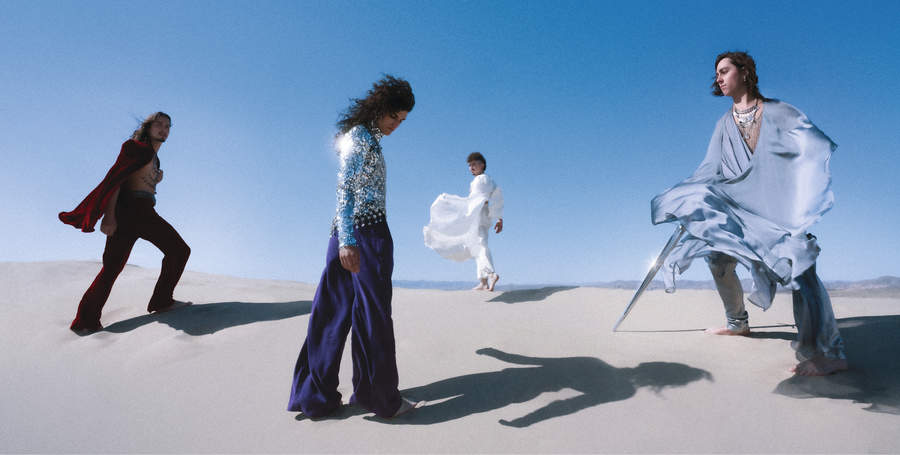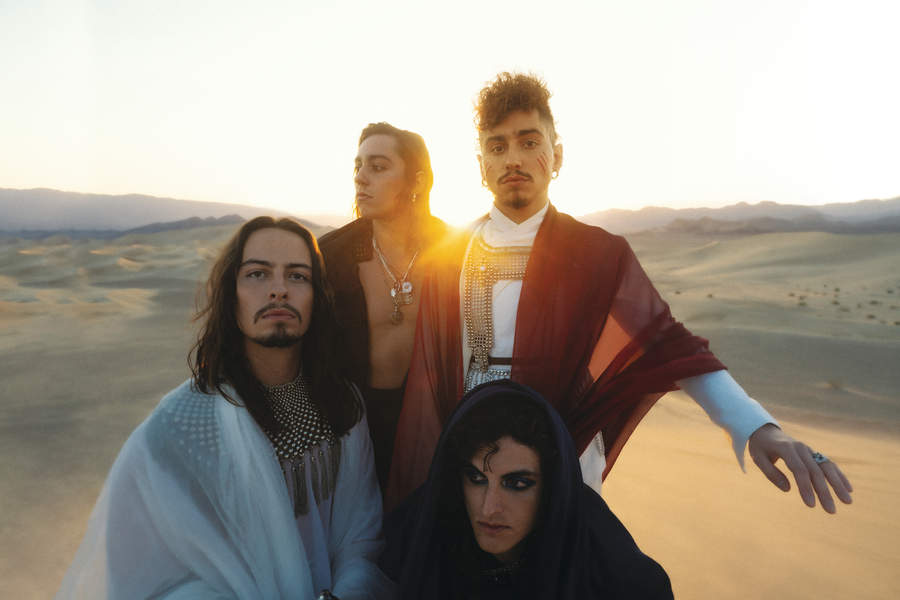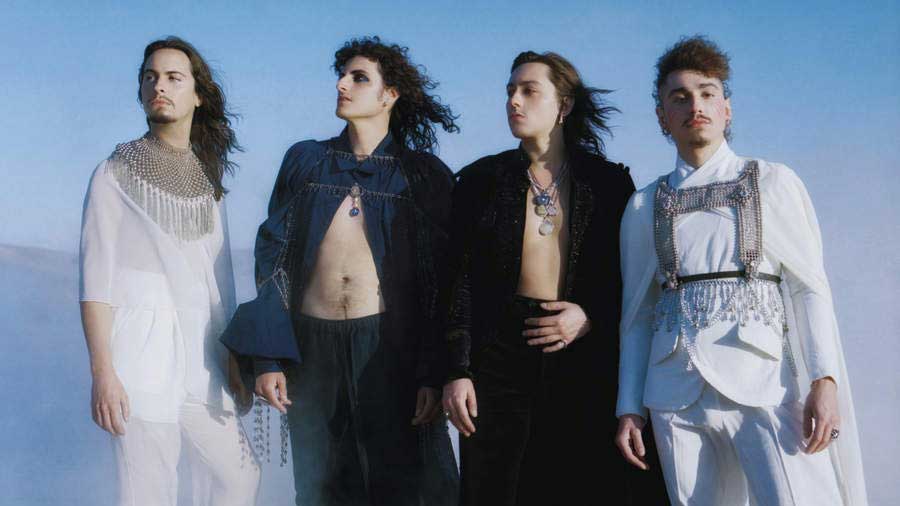"I'm singin’ in the rain, just singin’ in the raaaiiiin…" Greta Van Fleet lead vocalist Josh Kiszka, sporting a buzzed undercut and colourful southwestern print shirt, is singin’ in a mock movie-musical voice. And it is raining. Well, actually just sprinkling a bit on this muggy June afternoon. Not enough to make us leave the rooftop terrace at the members-only Soho House in the band’s adopted home town of Nashville, Tennessee. It’s Josh, twin brother guitarist Jake, younger brother bassist/keyboard player Sam and honorary brother drummer Daniel Wagner, all cheekbones and rock-star casual attire, chatty and constantly ribbing each other, the way brothers do.
Before we settle in, Josh tells the story of the happy accident that led to Malcolm McDowell singing Singin’ In The Rain in that memorable scene from the film 1971 film A Clockwork Orange. The Greta guys are serious music and pop-culture nerds, and during our hour-long conversation we’re joined by Jimi Hendrix, George Harrison, Eric Idle, Pete Townshend, Peter Sellers, Blind Faith, the Rolling Stones, David Bowie, Freddie Mercury and Led Zeppelin.
“It’s all part of ‘The Infisonicosm,’” Jake reveals with a grin. “We’re so nerdy that we’ve invented our own term for the Greta Van Fleet universe.”
“It’s short for infinite sonic cosmos,” Josh clarifies. “It’s kind of based on this Hindu idea of many worlds inside of many worlds.”

Musically, Greta Van Fleet’s Infisonicosm is a place of seemingly incongruous pairings. Epic guitar riffs burn alongside the transcendental humanism of Ralph Waldo Emerson, larynxshredding anthems gather in the classical poetic language of Dante and Chaucer. Because the band members have a mean age of 25, this can at times come off as surprising, not to mention precious and a bit suspect. But interviewing them, there is no doubting their purity of intention.
And there is no doubting that since their 2018 debut, their strange retro alchemy has turned them into both arena-filling sensations and enthusiastic upholders of rock traditions. Also, to their bewilderment, a favourite target of some critics. Muddy words like ‘derivative’ and ‘vampiric’ have been slung in their direction. That’s mostly due to the undeniable misty mountain Zeppelin-isms on their first album.
“Early on we were being shot with arrows and stabbed in the back from every angle,” says Jake, his face still showing a bit of hurt.
“But we’d meet people and they’d get where we were coming from,” says Josh. “They’d understand how important it is for us to be part of the lineage.”
“But we had to earn their respect,” Sam adds.
“There’s a great amount of responsibility in honouring the musicianship of our heroes,” says Daniel. “Bottom line is that we stand on the shoulders of giants that came before us.”

On their adventurous new album Starcatcher, you can hear their feet decisively lifting off those venerable shoulders, transcending influences and reaching for something more mature. The record began with the yearning to escape the anxiety and uncertainty of recent times.
“Coming out of two years of darkness and silence after covid,” Jake says, “we were trying to craft something sonically that was like an emerging light, like a chariot of fire coming out of the void.”
At the same time, Josh says they wanted to explore a different approach than the meticulous process that gave birth to 2021’s second album The Battle At Garden’s Gate.
“A big takeaway from making the last record was to sort of let go a little bit and trust the creative process, versus trying to forcefully meld a very specific thing. So we didn’t go in with the songs written.”
But finding a producer open to the risky prospect of creating music from scratch with the studio clock ticking wasn’t easy.
“We met with two or three who didn’t like the idea,” says Sam. “They couldn’t go one song at a time, and be comfortable trusting the process. But Dave Cobb did, and has now become an active and honorary member of the band.”
Cobb, best known for his production work with Jason Isbell and Chris Stapleton, invited the band into Nashville’s historic RCA Studio A. Built on Music Row in 1964 as a collaboration between country music producer Chet Atkins and sound designer John Volkmann, it’s an acoustic wonder. Its gymnasium-sized main room, big enough for choirs and orchestras, lends a startling depth and clarity to Starcatcher.
“That big room was like a playground,” says Daniel. “We’d go out there and just start grabbing guitars, jamming, singing. And with Dave there was a trust factor, of giving every idea the chance to see the light of day.”
Running a kind of creative relay, each member would squirrel away in RCA’s private rooms with nuggets of inspiration, develop individual parts, hand them off, then reconvene in the main room to capture new songs with fiery, first-take energy.
“The thing about a Greta Van Fleet song is it has to filter itself through the group,” Jake explains. “Every single member has to be able to touch it before it’s the essence of something complete.”
After a few intense weeks of living in the studio, they’d finished basic tracking. Obligations then sent them out on a 10-month world tour, where they road-tested a few of the new songs. In early 2023, they rejoined Cobb in a studio in his home town of Savannah, Georgia, to assess what they’d recorded at RCA and add overdubs.
The result of the year-long recording journey, Starcatcher, feels like 10 individual hand-crafted bottles, each containing not only caught stars, but also lightning bolts. From the sky-bound majesty of Fate Of The Faithful to the Thor’s-hammer assault of The Falling Sky to the otherworldly ballad Meeting The Master, a stunning showcase for Josh’s octaves-spanning voice, this is the sound of a band fulfilling their potential – with an accent on the potent.
“There’s light and shade, beauty and savagery on this record,” says Jake. “Within the confines of the way that we like to work, there’s a balance of elements. How deep down in the ocean can you dive until you drown, and how close to the Sun can you get before your wings burn? That’s the duality we were going for.”
“There’s something esoteric about the album thematically,” says Josh. “A lot of references to the occult, a lot of psychedelic texture, ancient tribal and medieval themes.”
Daniel adds: “At the same time, for all its ambition, the album is straightforward and concise, almost a return to the basics of how we started ten years ago.”
Greta Van Fleet started in Frankenmuth, Michigan, a tiny town (population 5,193) known for polka music, Bavarian-style fried chicken and the world’s largest Christmas store. Raised by hippie-ish parents, the three Kiszka brothers were exposed to everything from a sprawling record collection to a DVD library of old classic movies to philosophy books. Not exactly a standard upbringing for early 21st-century kids.
“There’s an element of circumstance in how we grew up,” says Jake. “You can say that’s an impediment as well, because we were kind of starved of what was then contemporary music. We would hear pop radio on the bus to school and at friends’ houses, and it was like: ‘Hmm, that doesn’t really move me as much as the records we’re hearing at home.’”
Raiding their parents’ collection meant listening to everything from “all the Kings – BB, Albert and Freddie” to Cream to Bad Company to Rush. It tells you a lot about the specific connections made that when Jake describes the beautifully nuanced guitar parts for Meeting The Master, he cites both Blind Faith’s Can’t Find My Way Home and Jethro Tull’s Reasons For Waiting as inspirations.
“It was a sonic playground in our house,” says Josh.
“Also, it was LPs and CDs, so sonically and visually you could touch it, hold it and listen to it,” adds Sam. “If we hadn’t grown up with these records, it would be difficult to try to pull off what we’re doing now,” says Jake. “It wouldn’t be as truthful or organic. We feel a responsibility to this type of music because of the craftsmanship. You create a song and it takes time, as opposed to relying on machines or AI. There’s an element of reward to all the attention and craftsmanship, then realising you’re becoming part of the lineage of this thing called classic rock.”
By the time they were teenagers, the brothers had started a band, playing mostly covers and blues, with a slightly altered name borrowed from one of Frankenmuth’s matriarchs, Gretna Van Fleet. When their original drummer failed to show up for a gig one night, close friend Daniel Wagner stepped in.
“That’s when Greta Van Fleet was really born,” Josh recalls. “Not only did we get a great drummer, but also a fantastic songwriter and multi-instrumentalist.”

The 10-year road to their upcoming tour of arenas and stadiums – including their debut at the mother of all rock venues, New York City’s Madison Square Garden – began with regular gigs at local dive bars, some frequented by bikers.
“We played at White’s Bar in Saginaw a lot,” Sam recalls, “and there would be a biker gang at the bar, and then the rival biker gang. They would be kind of standoffish for a while, then start beating the shit out of each other. We’d just play through it.”
Daniel: “Then one of the biker gangs said: ‘Hey, come to our place out in the woods, guys, and play for us. And if you ever need us, we’ll take care of you. Now, play us some more Hendrix!’”
“Once they liked our music, they offered us a kind of protection almost,” says Jake. “And they gave us crazy stuff as gifts, like coyote pelts,” Josh says with a laugh. “I still have a few of them.”
All that led to Greta Van Fleet being discovered, signed by Lava Records and launched onto the world stage (in that first year alone the band were headliners and musical guests on US TV’s Saturday Night Live). In early 2020, before the pandemic, the band relocated to Nashville, a move that might seem like an odd fit.
“We grew up coming to Tennessee in the summers to see family, so it felt like a home away from home,” says Josh. “There’s something electric about the town. To be around so many incredible musicians who’ve now become close friends, that’s been refreshing. It’s great to feel that you can say to somebody at a bar: ‘Hey, let’s record something,’ then you can drive to a studio in a few minutes and be cutting tracks.”
Although the face the city shows to the world is country music (“We love old country music,” says Daniel), anyone who spends time in Nashville soon discovers that the scene is fathoms deeper than a 10-gallon cowboy hat.
“It was kind of a shock to us when we met so many young musicians like us who were making rock’n’roll music,” Jake says. “There’s a community here. Something in the air. It feels like a movement, like Haight-Ashbury, the Greenwich Village folk scene, the Seattle punk scene.”
With Nashville being ‘the buckle of the Bible belt’ in the American south, it’s difficult not to wonder if there was some influence on Greta Van Fleet’s new album, whose lyrics include a healthy peppering of words like ‘pray’, ‘Lord’, ‘prophet’, ‘master’ and ‘sacred’.
“I like the poetry of Biblical text,” says Josh, “because it’s coming from a place that people believe is so spiritually potent.”
“But none of us are particularly religious at all,” says Sam. “It’s looking at it more from a literary point of view. We’re talking about the idea of God, not necessarily a Christian God.”
The formal tone of ancient verse and poetry runs through Starcatcher, separating it from everyday rock-isms about love and desire.
“You can fit a lot of visual inspiration into one sentence when you use that kind of classical language,” says Josh. “It feels more mythological, like telling an ancient tale. Like the line ‘Vengeance is a bow, and arrows only justice when fired’ from The Archer. I like the idea that the lyrics can contrast the brutality or savage aspects of Greta Van Fleet’s sonic elements.”
On a more down-to-earth note, the band’s new home is also unique as being a city full of famous people, yet somehow still paparazzi-free. So if you’re a local like Nicole Kidman, Eric Church or Peter Frampton, it’s a relatively chill place to go about your daily business. Although GVF have millions of rabid followers on all the usual social media sites, they say they like to maintain some distance, if only to preserve a bit of mystique, in the spirit of their 70s-era rock heroes.
“You wouldn’t have wanted to see David Bowie in the grocery store,” Sam says with a laugh. “Social media invites overexposure. So you really have to control your own image. We like to keep it as authentic as possible.”
“I think we speak mostly through our work,” says Daniel. “That’s the way we want to communicate with the audience – through our music.”
“We’re so nerdy that we’ve invented our own term for the Greta Van Fleet universe.”
Jake Kiszka And that’s precisely what they’ll be doing as they set out on the Starcatcher world tour this summer (with UK dates in mid-November). Discussing the finer points of touring, we ask about pre-show rituals, and get answers both silly and serious.
“We like to cut off a lamb’s head before we go on,” says Sam.
“We try to arouse each other,” says Jake. “No, really, Josh likes to isolate himself,”
Sam says. “He’ll keep coming in the room where the three of us are hanging out and say: “Hey, can you play Black Smoke Rising?’ We’ll start playing it, and he’ll say: ‘Oh no, my hair, my hair!’ and run back out of the room.”
Josh laughs. “Well, I do get fairly nervous before a show. It’s not fear, it’s just anticipation and excitement. It takes me a whole day to get in the zone. I’m not one of those singers who doesn’t have to warm up. I’ll drink a very steep hot toddy before I go on. It’s like an elixir.”
“We always have instruments in our hands for hours before we go on stage,” says Daniel. “And we’ll wait until the very last second to get to the stage. Almost like a game. Once we’re up there, we’re all trying to outdo each other, to see who’ll be the last man standing.”
Asked what for them lies beyond Starcatcher and touring, Sam points to one of the large trees looming above the Soho House rooftop terrace.
“Think of a tree,” he says. “The best thing is to keep growing and shedding skin. And that’s hopefully what we’re doing to rock’n’roll music. We don’t want to be stagnant and keep doing the same thing that’s been done."
Starcatcher is out now via Lava/Republic.

